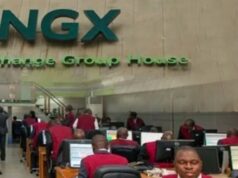ABUJA, SEPTEMBER 4, 2018 – The total foreign exchange (forex) interventions by the Central Bank of Nigeria (CBN) stood at $963 million in August, a report by Financial Derivatives, a financial market research firm, has shown.
According to the report, the forex interventions have helped to stabilise the naira against global currencies, especillay, the dollar.
At the parallel market, the naira started the period at N360/$, and inched up marginally, closing at N361/$ on August 28th.
No More Ranting Online For Free – Get Paid To Do What You Normally Do Online
This can be attributed partly to the CBN’s intervention of approximately $963mn in the period. The naira also appreciated against the pound and euro to close at N464/£ and N412/Euro on August 28th from N474/£ and N415/Euro on August 13th.
At the interbank foreign exchange market, the naira started the period at N306.05/$, and depreciated marginally by 0.033 per cent to close at N306.15/$ on August 28th.
The naira depreciated by 0.050 per cent to close at N362.38/$ at the IEFX window from N362.20/$ on August 13th. Total forex traded at the IEFX window was $2.93 billion, compared to $1.73 billion in the corresponding period in July.
The level of Nigeria’s gross external reserves decreased by 1.24 per cent (down $570 million) to $45.99 billion as at August 27th from $46.56 billion on August 13th. This was partly due to the increase in forex intervention – $963 million in August compared to $909 million in the corresponding period in July. The import cover also decreased to 11.26 months from 11.40 months on August 13.
Short term interest rates (OBB and ON) declined by 183 basis points and 159 bps respectively to close at 9.92 per cent and 10.83 per cent per annum. Total OMO sales during the period was N251.44 billion compared to maturities of N878.36 billion resulting in a net inflow of N626.92 billion.
Average opening position of banks during the period was N300.87 billion compared to N295.84 billion in the corresponding period in July. At the last primary market auction on August 15th, the 91-day and 182-day T/Bills tenor remained flat at 10 per cent and 10.40 per cent respectively while the 364-day tenor declined by 8bps to 11.22 per cent pa. At the secondary market, the 91-day T/bill declined to 10.85 per cent from 11.30 per cent, while the 182-day T/Bills and 364-day T/Bills tenor increased by an average of 3 bps in the review period.
Nigeria’s economy has expanded by an average of 1.73 per cent year-to-date. Whilst Nigeria’s GDP growth rate has remained positive for five consecutive quarters since its exit from the recession in second quarter of last year, it remains below its population growth rate of 2.7 per cent. The decline in quarter-on-quarter growth is also reflective of a much needed boost to the real sector. The introduction of initiatives such as the Differentiated Cash Reserve Requirement and the Corporate Bonds Funding Programme targeted at improving credit to employment elastic sectors including agriculture and manufacturing sectors is a welcome development. This would increase borrowing in these sectors, improve activities and boost economic growth. However, the slowdown in growth rate in Q2’18 would be a key consideration for the MPC at its next meeting on September 24/25.









